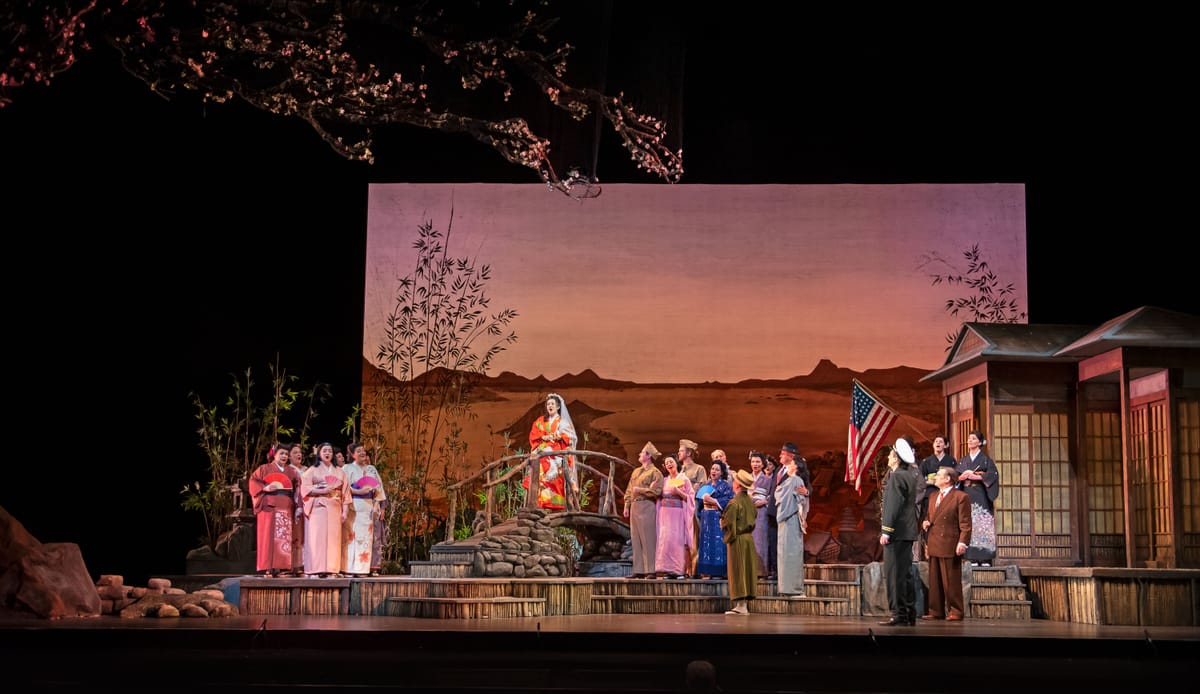
By Elke Porter | WBN News Vancouver | April 27, 2025
Trigger Warning: Themes of abandonment, war trauma, and cultural isolation.
On Opening Night of Madama Butterfly, the anticipation inside the Queen Elizabeth Theatre was electric. Most of the 2,700+ seats were full, creating a palpable buzz. Before the curtain even rose, we were all pleasantly surprised to be asked to stand and sing the Canadian National Anthem together—a touching moment of unity that set a respectful and hopeful tone for the evening. Maybe to offset the giant American flag that showed up within minutes in the opening scene.
The story was of American Lieutenant Pinkerton, stationed in Nagasaki, who marries a young Japanese girl, Cio-Cio-San. For him, it’s a marriage of convenience, a touristic fantasy abroad before he finds himself a “real” (American) bride. For Cio-Cio-San, it begins her story of tragically unrequited love.
The staging, set design, and thoughtful pre-show explanations made the story accessible and immediate, pulling the audience into Butterfly’s world. Notably, the opera’s narrative, set in Nagasaki, reflects three poignant scenes from 1946 to 1953 during the American Occupation of Japan, a period that mirrors Butterfly’s own struggle against cultural and personal betrayal. One unforgettable moment came when Butterfly was asked her child’s name. She answered simply, "Now I call him Sorrow, but if my husband comes back, I will call him Joy." That line captured the heart of the opera—love struggling to survive overwhelming sorrow.
In the Vancouver Opera’s 2024–2025 season finale production of Madama Butterfly in Vancouver, BC, the casting emphasized authenticity with a notable inclusion of Japanese and Japanese-heritage performers, enhancing the cultural resonance of Puccini’s tragic masterpiece. Tokyo-born soprano Yasko Sato, praised for her “disarming, honest, refined, and authentic” portrayal, led the cast as Cio-Cio-San and made her Canadian debut on opening night April 26, and also on performances to be held May 1, and May 3. She will be joined by Japanese mezzo-soprano Nozomi Kato as Suzuki, Butterfly’s loyal confidante, adding depth to the production’s Japanese representation.
The double cast also features Korean-American soprano Karen Chia-Ling Ho as Cio-Cio-San on April 27 and May 4, ensuring a strong Asian presence in the lead role across all five performances at the Queen Elizabeth Theatre. The Vancouver Opera Chorus, under the direction of Leslie Dala since 2004, played a vital role in bringing Puccini’s lush score to life, complementing the international cast with their seasoned artistry.
This thoughtful casting and the chorus’s contribution elevated the emotional weight of the scene where Butterfly reveals her son, making the young actor’s surprise entrance—described as a show-stealing moment—even more poignant within the culturally sensitive framework. The production, conducted by Maestro Jacques Lacombe and directed by Mo Zhou, was lauded for its balance of tradition and authenticity, with the Japanese actors and chorus amplifying the opera’s heartbreaking narrative.
Yasko Sato, as Cio-Cio-San, embodied Butterfly’s unyielding optimism, holding fast to the belief that her husband, Pinkerton, would return to her. She clung to the fragile hope that he had not married another woman, that she could continue living with the man into whom she had poured her heart and soul—a man whose love had led her to sever ties with her entire family. Her kin, relishing her pain and sorrow after Pinkerton’s abandonment, left her isolated atop a literal and metaphorical mountain, friendless and alone, like countless other women forsaken in similar situations.
Yet despite the tragedy, the performance left the audience uplifted, moved by Butterfly’s enduring strength and unwavering grace. In the final scene, Butterfly takes her father’s dagger and reads the inscription out loud: "He who cannot live with honor, must die with honor." I encourage you to buy your ticket today so you can find out how the story ends.
Background Story
It is interesting background that Puccini wrote five versions of Madama Butterfly. The original two-act version, premiered at La Scala on 17 February 1904, was withdrawn after a disastrous reception. Puccini then rewrote it as a three-act opera, and this second version, performed on 28 May 1904 in Brescia with Solomiya Krushelnytska as Cio-Cio-San, was a great success. This version debuted in the United States in 1906, first in Washington, D.C., in October, and then in New York in November, by Henry Savage’s New English Opera Company, which used English translations.
In 1906, Puccini crafted a third version, performed at the Metropolitan Opera in New York on 11 February 1907. Later that year, he revised the orchestral and vocal scores, creating the fourth version. In 1907, Puccini finalized the opera with a fifth version, known as the “Standard Version,” which is most commonly performed today, though the original 1904 version is occasionally revived, such as for La Scala’s 2016–17 season opening on 7 December 2016, conducted by Riccardo Chailly.
Vancouver Opera closed its 65th season with a breathtaking production of the "Standard Version" that honored the beauty, heartbreak, and resilience that define Madama Butterfly. Every production company brings its own twist, and Vancouver truly rose to the occasion. The audience was fully swept up in the emotion of the evening, especially when the main character dramatically threw aside the giant American flag—a powerful moment that drew audible gasps. It was an unforgettable night. Find out more here: https://www.vancouveropera.ca/whats-on/Butterfly/
#Madama Butterfly #Vancouver Opera #Opera Review #Postwar Japan #Puccini #Live Performance #Opening Night #Cultural History WBN News Vancouver #Elke Porter
Connect with Elke at Westcoast German Media or on LinkedIn: Elke Porter or contact her on WhatsApp: +1 604 828 8788

